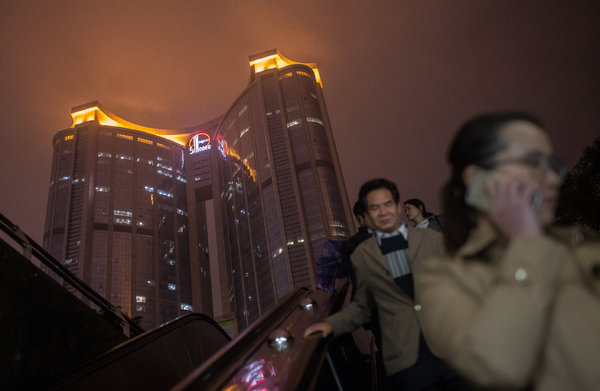Image source: http://www.nytimes.com/2015/03/15/business/dealbook/in-china-a-building-frenzys-fault-lines.html
Chuang will blog a news update about once a week. This is our first installment.
“In China, a Building Frenzy’s Fault Lines” by DAVID BARBOZA, New York Times, MARCH 13, 2015 http://www.nytimes.com/2015/03/15/business/dealbook/in-china-a-building-frenzys-fault-lines.html?_r=0
This story outlines the rise and fall of Chinese property developer Kaisa, detailing the corruption and shady deals involved. Starting out as a small Shenzhen property development company, Kaisa grew to be a big player with help from foreign investors and Chinese officials. But as the officials that helped Kaisa to rise came under corruption investigations and the property market began to stall, Kaisa’s complex dealings began to unravel, revenues never met expectations, and bets were lost.
“The Coming Chinese Crackup” by David Shambaugh, The Wall Street Journal, March 6, 2015
http://www.wsj.com/articles/the-coming-chinese-crack-up-1425659198
In a much read article, Political Scientist at George Washington University, David Shambaugh argues that the Chinese Communist Party is on its last legs. Shambaugh points to five indications that CCP rule is near its end: “China’s elites have one foot out the door;” Xi Jinping has stepped up political repression; Chinese leaders don’t seem to believe in the party anymore; the level of corruption in society even beyond the party; and the Chinese economy is stalling. Many have critiqued Shambaugh for his argument (see below). But while he isn’t that persuasive, it is clear that the Chinese economy is hitting the rocks. How bad the current troubles are is hard to gage. So perhaps the more important way to begin thinking about this isn’t from a political science perspective critical of CCP rule, but instead we should ask what happens to Chinese politics if the economy heads into crisis.
“Is China Really Cracking Up? A ChinaFile Conversation,” with Suisheng Zhao, Arthur R. Kroeber, Ho-fung Hung, Howard W. French, Peter Mattis, Ryan Mitchell, Chen Weihua, March 11, 2015.
http://www.chinafile.com/conversation/china-really-cracking
ChinaFile asks seven China experts to respond to David Shambaugh’s prediction that the CCP is in its end game. While most of the seven see the potential for a political or economic crisis in China, few agree that this spells the end for the CCP.
“Why David Shambaugh’s ‘Coming Chinese Crackup’ Case Is Wrong,” by Stephen Harner, Forbes, March 10, 2015.
Harner, too, sees Shambaugh off the mark. Harner sees “the most likely outcome” of the current situation “is a much stronger, more legitimate, and more effective CCP and government at all levels.”
“National security? China ready to slam door on foreign NGOs,” by Peter Ford, The Christian Science Monitor, March 10, 2015.
“The Chinese government is drafting a new foreign NGO law that is widely expected to make work more difficult, if not impossible, for many of the 6,000 overseas non-profits that operate here in a broad range of fields from education and the environment to HIV-Aids and legal education.” The law would make it very difficult for foreign-funded non-profits to operate in China.
“Chinese Labor Strike: 5,000 Workers Strike At Factory Making Shoes For Nike, Timberland, Kenneth Cole; Police Dogs Deployed,” by Angelo Young, International Business Times, March 10, 2015.
“A strike at a Chinese factory that makes shoes for Nike, Timberland, Kenneth Cole and other popular brands grew on Tuesday to about 5,000 workers who are demanding their employer pay its government-mandated monthly housing allowance. Workers for Stella Shoe Co., based in the southern industrial city of Dongguan, began the strike on Sunday and were joined Tuesday by hundreds more Stella employees from another facility.”
“Over 1,000 human rights activists were detained since President Xi took office,” by Teng Biao, The Irish Times, March 10, 2015.
Human Rights lawyer Teng Biao argues that the Xi Jinping administration is more repressive than recent predecessors. “Over a thousand human rights activists have been detained since Xi took office, and Chinese human rights defenders are facing the most severe crackdown since the Tiananmen massacre in 1989. Xi’s suppression is widespread, targeting not just those at the forefront of the human rights struggle in China, but also faith groups, internet users, universities, and the media.”
“Corruption And Xi Jinping’s China,” Damien Ma, David Lampton, and Susan Shirk discuss corruption and the Xi administration on WBUR’s On Point, March 10, 2015.
http://onpoint.wbur.org/2015/03/10/china-corruption-xi-jinping-economy-growth-communist-party
“China protests over ‘deadly Myanmar border raid,’” BBC, March 14, 2015.
http://www.bbc.co.uk/news/world-asia-31885318
After a Myanmar jet reportedly dropped a bomb on Chinese territory, killing four, China sends jets and protests. The area across the Myanmar border is contested by rebels.
“Support for China-led development bank grows despite US opposition,” by Tania Branigan, The Guardian, March 13, 2015.
“Support for a Chinese-led development bank is growing despite US opposition, with Australia indicating that it could join the UK and New Zealand as a founding member…. The Asia Infrastructure Investment Bank (AIIB) , which is designed to provide funds to the Asia-Pacific region, is viewed with suspicion in Washington, where it is seen as a rival to the World Bank and a possible instrument of Chinese soft power in the region.”
“A Windfall for China as Commodity Prices Plunge,” by Mark Mangier and Chuin-Wei Yap, The Wall Street Journal, March 12, 2015.
http://www.wsj.com/articles/a-windfall-for-china-as-commodity-prices-plunge-1426216191
Lower commodity prices, especially on oil, copper, and other metals, is saving China in particular a huge amount, up to $600 million a day on oil imports.
“China’s rubber-stamp parliament is a billionaires’ club,” CNN Money, March 11, 2015.
http://money.cnn.com/2015/03/10/news/economy/china-billionaire-parliament/
Some of China’s wealthiest individuals are now members of the National People’s Congress.
“Chinese Anger Over Pollution Becomes Main Cause of Social Unrest,” Bloomberg News, March 6, 2015.
According to a retired CCP official, “pollution has replaced land disputes as the main cause of social unrest in China.”

